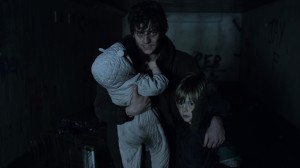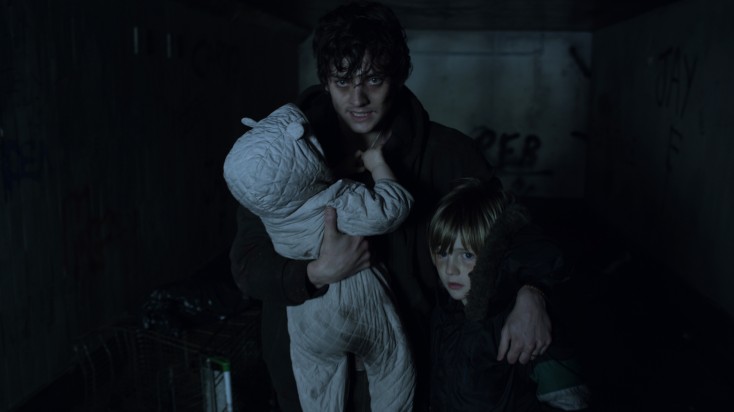
Tommy Cowley (Aneurin Barnard, center) must protect his family from thugs in “Citadel.” ©FLATIRON FILMS.
By ANGELA DAWSON
Front Row Features
HOLLYWOOD—In the sci-fi thriller “Citadel,” a young widower has to protect his baby from would-be predators that roam his housing project. You’d think he’d simply run away, but Tommy Cowley (played by Welsh actor Aneurin Barnard) is agoraphobic, so he’s trapped in his house like a prisoner. He seeks the help of a disillusioned priest (James Cosmo) to overcome his fear—and he does so by stepping into the place that scares him the most, an abandoned high-rise that looms above his decrepit neighborhood. What resides within the crumbling walls is dark and not altogether human.
The story is based on Irish filmmaker Ciaran Foy’s personal experience. As a teenager, thugs in his neighborhood, not once but on several occasions attacked Foy. He literally became a recluse, refusing to leave his house. The only thing that got him out was getting an acceptance into film school. He eventually decided to write about his experience, which, he says, he found disturbing and yet cathartic.
The result of his writing became the basis for“Citadel,” which has received critical acclaim. It was the winner of the Midnighter Audience Award at the 2012 SXSW Film Festival in Austin, Texas.
Foy recently spoke by phone about his feature film debut, the frightening ordeal that inspired him and what’s ahead.
Q: This film stemmed from personal experience you had. Was it tough getting started on writing this?
Foy: The writing by far was the hardest thing I did. The shoot was chaotic. We had 23 days to shoot. There was no objectivity. It was just get the camera set up for the next shot. To write the script, I had to bathe my mind in certain scenarios and situations you’d rather forget. Ultimately, it was something I felt in the midst of it, I felt I was taking steps backwards, but eventually it became cathartic in a sense that I almost started to echo the arc of the main character. At the end of it, I felt quite empowered and in control of things, and I was able to hold in my hands something I created that allowed me to be the master of those fears and memories. So it was oddly therapeutic writing the screenplay.
Q: Is the tower block in this film a symbol of our fears?
Foy: Yeah. In a wider perspective, yeah. For me, it represented from Tommy’s point of view, or any agoraphobic’s point of view, the threshold you can’t walk through. The thing that represents your greatest fears and what ultimately is your greatest weakness as an agoraphobic is a door. It’s something you can’t walk through. It’s something that holds you prisoner. For me, the door became the image of the movie. I was looking to replicate that shape in as many things as I could. That rectangle can be a tombstone. It can be a tower. I tried to frame Tommy in as many rectangles as possible to keep him trapped within that shape. The tower block is always watching over his shoulder or he is trapped or framed in some sort of rectangle that suddenly starts to free up as the movie goes along. It’s the symbolic resonance I was aiming for. It is the manifestation of the character’s greatest fear and hopefully the audience will identify with that.
Q: Rarely do we see a young father who is victimized onscreen. Did you ever think about making your protagonist a woman?
Foy: They say statistically there are more female agoraphobics than male, but there is a strong opinion among psychiatric professionals that that’s because so many men will not admit to it because they have to live up to a certain role and condition. Where I grew up, one image you saw a lot was really young fathers pushing buggies around with kids in them, and it’s an image I haven’t seen that much on screen before. But there are a lot of single fathers and young fathers. In getting the financing of the movie, that question came up a lot: why don’t we make Tommy female? But I thought it was a lot more interesting to turn things on its head. That’s what filmmaking is all about. It’s based on real life. When you have an anxiety and panic-related condition, as a male it’s almost more crippling because you’re expected to adopt a certain societal role. Also, that’s where I was at 18, and how I saw the world and saw myself. You feel shame and guilt, which are great emotions for an actor to play with and for anyone to use in a creative capacity.
Q: Did your script always have the supernatural element to it?
Foy: Yes, otherwise this film would have had some political angle. You’re saying something if they’re real people. I wanted permission to create a fantasy of how I saw the world at 18, and what my desires were, and the youth that attacked me, and how I saw them, and my nightmares, and secret wishes and fantasies, and things to do with vengeance. As you move through life, the more you understand the socioeconomic reasons for the way things are and things are far more complex than you perceive them when you’re young. With fantasy, you get to explore that so-called terrifying creature, without necessarily having some sort of political element in your storytelling.
Q: What about the priest character? Did he come from your imagination?
Foy: I wanted to have this as a story that has to do with abandoned fathers. I kept running with this theme of “fear of fatherhood,” something I guess encapsulated a lot of what I was trying to do with the movie. Tommy is a reluctant father, and the priest is also a reluctant spiritual father. He questions his faith and sees that (God) is no longer there for him. He sees how corruption can set in and things can get twisted and left to rot—and how we need fathers. Tommy, at the end, has overcome his fears but it’s also the first time he acts like a proper father because up until that point, there is no love between him and the baby. One day he was in love with (his wife) Joanne and the next day she was taken from him and in her place he’s given this infant. It’s only at the end where he is embracing the role. From that point of view, I thought that would be interesting. And from a horror genre point of view, I wanted to veer away from the traditional thing where the Catholic priest has all the answers to what’s happening. I wanted to have a fatalist priest who didn’t have answers to a real threat. The (monsters) are feral kids who are inbreed. They’re not ghosts or demons or something fantastical, so I wanted to have fun with the genre conventions.
Q: You’re married now. Do you have kids?
Foy: I was at a festival recently and the emcee said to me, “Your film effectively made me sterile,” and he asked me, “So does this mean you don’t want to have kids?” And actually, it’s the opposite. I would love to have a family one day.
Q: Some guys are terrified of fatherhood, even without demons chasing them.
Foy: I’ve already made my film about (fear of fatherhood) so I’ve made my peace with it.
Q: Do you think there is a physiological thing that some people have that makes them more likely to be victims?
Foy: Absolutely. In many ways, that’s kicked off the genesis of “Citadel.” After my attack, and I was housebound for a time, and ultimately I received a letter that said I’d been accepted into film school, which actually was the push I needed to force myself out the door. I felt OK going out during rush hour, and all that, I ultimately found the girl who is now my wife at film school, and she suggested I go see this free counselor that was at the college, so I went to placate her. I thought it was ridiculous that you could talk to somebody and be cured, but it turned out to be the best thing I could have done. One thing this counselor said to me, was that research had been done that would indicate that a pedophile could enter a room and immediately identify a former victim, based on the tiniest amount of body language that we take for granted. Similarly, these street thugs or predators that attacked me, it’s almost like they could see my fear. You can be walking down the worst area possible, but if you look like you know where you’re going, it’s like they don’t see you. I thought that was the creepiest concept because there’s a weird truth to that. So when I was writing the script for this, I started to sketch this idea of this creature that was essentially blind but could see fear. The big theme in the movie was believe in yourself, then you will be master of all that.
Q: Have you thought about what you’d like to do next? Are you going to stick with this genre or do a comedy?
Foy: I want to stay within the realms of genre, not necessarily horror. I’m reading a lot of stuff I’ve been sent. At the moment, I’m writing a script that’s science fiction, but I can’t say what the title is. And I’m reading and trying to find projects I can collaborate on a script that exists and run with it. What I don’t want to do again is sit down with that blank piece of paper and write a script from scratch. That eats up your time and can take years, and I’m really itching to get behind the camera again.





